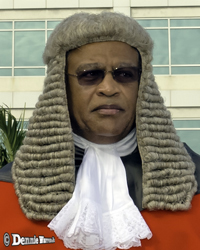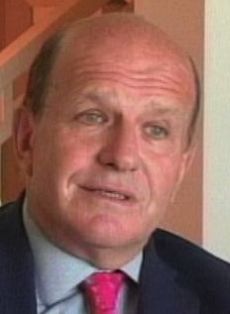Archive for January 12th, 2011

Restore legal aid to court, says CJ
 (CNS): The country’s top judge has called on government to return the legal aid budget to the judiciary and remove the continuing uncertainty surrounding the funding of legal representation. Speaking at the official opening of the 2011 Grand Court session, the Cayman Islands’ chief justice, Anthony Smellie, said that although both the law and the country’s Constitution place the responsibility for legal aid and the duty to ensure fair trials on the courts, no budget had been allocated to them to fulfil their essential functions as the money was given to the Ministry of Finance instead. Smellie urged the government to restore the legal aid budget to the courts. (Photo by Dennie Warren Jr)
(CNS): The country’s top judge has called on government to return the legal aid budget to the judiciary and remove the continuing uncertainty surrounding the funding of legal representation. Speaking at the official opening of the 2011 Grand Court session, the Cayman Islands’ chief justice, Anthony Smellie, said that although both the law and the country’s Constitution place the responsibility for legal aid and the duty to ensure fair trials on the courts, no budget had been allocated to them to fulfil their essential functions as the money was given to the Ministry of Finance instead. Smellie urged the government to restore the legal aid budget to the courts. (Photo by Dennie Warren Jr)
“While, as a purely administrative exercise, the bills are being paid as submitted by the judicial administration, we could not agree, as proposed by the ministry, that the ministry should be able to override the judiciary’s decisions, made under the law, to grant legal aid,” the chief justice said.
He pointed out that the subject of legal aid had been thoroughly examined and the existing system found to work well. He called for the executive arm of government “to allow matters to return to normalcy”, suggesting that any necessary improvements to the existing system could readily be addressed.
The premier first announced his decision to take the legal aid budget into his ministry at a late night sitting of Finance Committee during his government’s first budget meeting at the Legislative Assembly in 2009. The plan at the time had been to open an independent legal aid office with two local attorneys at the helm. However, while the proposed legal aid office has not yet materialized, the budget appropriation has remained in the Ministry of Finance.
The chief justice said that returning the legal aid budget would restore a sense of permanence to the administration of justice for the Islands. “This is vital to the ongoing ability of the courts to ensure that there are fair trials in criminal cases in particular, as it is also in respect of many cases involving the welfare of children and families,” he said.
He pointed out that the uncertainty surrounding the issue was also causing problems with legal representation. “At the best of times the number of lawyers who have been willing and able to take on criminal cases has been very small relative to the overall size of our bar,” he said, adding that the number had dwindled recently in response to reasonable concerns over the legal aid system.
“As all but a few of the criminal defendants facing serious charges qualify under the law and so must be given legal aid, the defence lawyers are called upon to dedicate themselves to a practice that depends almost entirely on legal aid funding. It is simply unreasonable, therefore, to expect them to do so in a prolonged climate of uncertainty,” he added as he thanked those defence lawyers who had been willing to carry on regardless.
James Bergstrom, the president of the Cayman Islands Bar Association, also raised the issue of legal aid in his presentation. He pointed out that the association had supported the Law Reform Commission’s findings in the report which was tabled in the Legislative Assembly in 2008. This report found that the legal aid system administered by the courts offered value for money and endorsed the system, with some recommended improvements that the chief justice said had been identified and agreed. In the wake of the premier’s announcement that he wished to change the way legal aid was managed, a committee was established by Cabinet to examine the subject. That committee completed a report in March of 2010. However, the report has not yet been made public.
Bergstrom called on government to reveal the report as he emphasised the importance of a legal aid system and asked government to return the responsibility to the courts, which are responsible for the administration of justice. “The current situation is unsatisfactory and we want to see it brought back to the courts,” he said.
CNS made an FOI request for the report last year, which was denied because the ministry said the report had not yet gone before Cabinet. Since then, we have askedfor an internal review, the outcome of which has not been revealed despite several months having passed. The issue is currently being investigated by staff from the Information Commissioner’s Office.

Anglin charged in 2nd killing
 (CNS): Twenty-four-year-old Devon Anglin of West Bay has been charged with the killing of Carlo Webster in September 2009. Police confirmed that a man had been charged with the nightclub murder on Wednesday afternoon and was expected to appear in Summary Court in due course. This is the second charge of murder that Anglin faces as he is already on remand accused of the fatal shooting of four-year-old Jeremiah Barnes in February of last year at a West Bay gas station. Thirty-two-year-old Webster was gunned down inside the Next Level nightclub on West Bay Road when more than 150 customers were reported to be on the premises.
(CNS): Twenty-four-year-old Devon Anglin of West Bay has been charged with the killing of Carlo Webster in September 2009. Police confirmed that a man had been charged with the nightclub murder on Wednesday afternoon and was expected to appear in Summary Court in due course. This is the second charge of murder that Anglin faces as he is already on remand accused of the fatal shooting of four-year-old Jeremiah Barnes in February of last year at a West Bay gas station. Thirty-two-year-old Webster was gunned down inside the Next Level nightclub on West Bay Road when more than 150 customers were reported to be on the premises.
The police said at the time that they believed the killing was gang related and, despite CCTV cameras and so many people present when Webster was shot in the head, they struggled to find anyone willing to come forward. Officers arrested three men shortly after the killing and one was detained for 12 days in accordance with the law, but police said there was not enough evidence at the time to bring charges.
Since the murder, the night club, which is situated in the heart of the tourist district, has changed management and has been renamed Jet Nightclub.
Anglin was arrested and charged with the murder of Jeremiah shortly after the shooting in February and has been in custody ever since. Although a date has not yet been fixed for the trial, the case has been sent to Grand Court andis expected to be heard later this year.

Motorcyclist suffers serious injuries in smash
(CNS): Police said on Wednesday morning that they are seeking witnesses to a motorcycle smash which took place in Bodden Town on Tuesday afterrnoon, 11 January. A 25-year-old man who was injured when he crashed into a wall yesterday has been airlifted to Jamaica for treatment. At around 2:00pm the man was riding the motor bike in Bodden Town Road, and as he approached Gun Square he apparently lost controlof the machine and collided with a wall. Police said no other vehicles were involved in the collision. Emergency service attended the scene and the rider was taken to the Cayman Islands Hospital in George Town suffering from serious injuries.
Police added that their enquiries into the collision are ongoing and anyone who witnessed the incident is asked to contact the PC Donovan Chong of the RCIPS Traffic Department on 946-6254.

Travers calls author of ‘tax haven’ book an ‘imbecile’
 (CNS): The chair of Cayman finance has called Nicholas Shaxson, the author of a new book on tax havens, an imbecile in an interview with Cayman’s local television news channel. Anthony Travers hit out at the book, Treasure Islands: Tax Havens and the Men Who Stole the World, and its author saying that the work demonstrates no more than an 11-year-old’s understanding of off shore finance. The chair of the country’s financial industry body suggested that Shaxson’s position came from the politics of envy. “I don’t know what he’s talking about and furthermore he doesn’t know what he’s talking about,” Travers said of Shaxson.
(CNS): The chair of Cayman finance has called Nicholas Shaxson, the author of a new book on tax havens, an imbecile in an interview with Cayman’s local television news channel. Anthony Travers hit out at the book, Treasure Islands: Tax Havens and the Men Who Stole the World, and its author saying that the work demonstrates no more than an 11-year-old’s understanding of off shore finance. The chair of the country’s financial industry body suggested that Shaxson’s position came from the politics of envy. “I don’t know what he’s talking about and furthermore he doesn’t know what he’s talking about,” Travers said of Shaxson.
“There are always going to be the politics of envy. Now the politics of envy are exacerbated by imbeciles who don’t actually understand what’s going on in the Cayman Islands,” he added.
Travers told Cayman 27 that is it’s a fiction that Cayman is a tax haven or a magnet for illicit transactions. While impossible to eliminate in their entirety, he said there are places where money laundering or tax evasion are easier and Cayman isn’t one of them. “There are simply jurisdictions where it would be more sensible to perpetuate your fraud or money laundering than the Cayman Islands,” Travers stated.
In reply, Richard Murphy from the NGO Tax Justice Network, the organization of which Shaxson is also a member, said Travers’ argument might be more credible if he didn’t resort to words like "imbecile" or suggest that every criticism of Cayman "is the politics of envy".
Shaxson also responded and said that Travers had refused to talk to him when he came to the Cayman Islands. He challenged the Cayman Finance chair to explain in detail why his full arguments in the book are wrong but noted that he did not think Travers had actually read the book.
“To be honest, it heartens me that my critics feel they have to resort to name-calling and misrepresentation to try and knock me down. I now await some real arguments,” Shaxson said.

Bank boss denies using Cayman for tax evasion
 (CNS): The Chief Executive Officer of Barclays Robert Diamond has told UK parliamentarians that the bank doesn’t evade taxes and pledged to examine the number of offshore operations it has, according to reports in the international media. “Barclays is not evading taxes,” Diamond told a Treasury Committee hearing at the House of Commons in London on Tuesday. “We are complying with the spirit and the letter of the law.” Diamond was answering questions from parliamentarians who suggested that the bank had more than 300 companies operating in the Cayman Islands, the Channel Islands and other “known tax havens.”
(CNS): The Chief Executive Officer of Barclays Robert Diamond has told UK parliamentarians that the bank doesn’t evade taxes and pledged to examine the number of offshore operations it has, according to reports in the international media. “Barclays is not evading taxes,” Diamond told a Treasury Committee hearing at the House of Commons in London on Tuesday. “We are complying with the spirit and the letter of the law.” Diamond was answering questions from parliamentarians who suggested that the bank had more than 300 companies operating in the Cayman Islands, the Channel Islands and other “known tax havens.”
Barclays paid 2 billion pounds ($3.1 billion) in UK tax last year, said Diamond. He said he would write to the committee later to show what percentage of that payment was payroll tax. Diamond also told the committee it was time to stop apologizing for the credit crisis as the industry had already offered its regrets. He said the “period of remorse and apology” needed to end so that banks could rebuild confidence.
Taxpayers provided about 1 trillion pounds ($1.56 trillion) to assist banks during the financial crisis, while the independent Office for Budget Responsibility estimates that the resultant spending cuts will cost the jobs of more than 300,000 government employees.
Chancellor of the Exchequer George Osborne has told the British parliament that Barclays should cut Diamond’s 2010 bonus and that all payouts should be lower than a year earlier. Banks will pay more tax and lower bonuses, while doing more lending, Prime Minister David Cameron also told the House of Commons.

Cayman risks losing constitutional gains

During the first legislative sitting of the New Year the government brought several pieces of new legislation to the Legislative Assembly in which the term “Governor in Cabinet” continued to be used — an issue that McLaughlin says he is objecting to for far more then semantics. He believes the dangerous and unnecessary use of the term is giving back power to the governor which had been eroded during the constitutional talks.
The changes in the new Constitution regarding government, he said, were about much more than creating a premier. The long negotiations with the UK involved finding a way to give the country’s elected representatives more control and responsibility, addressing the political balance of power more in favour of those who are elected. McLaughlin said the premier’s decision to return to the old way of describing government is a way of avoiding taking responsibility for the decisions the UDP government is making. It is giving the false impression to the public that the governor is still involved in the day to day running of government.
“Cabinet is no longer an advisory body to the governor in terms of general policy,” said the MLA who was one of the main architects of the 2009 Cayman Islands Constitution. He explained that outside the governor’s areas of responsibility, such as law and order, the day to day areas of governance under the various elected government ministries are now the responsibility of those elected officials and the premier should be taking on that responsibility.
“It is regrettable that the government is continuing this constitutional fiction,” he told his legislative colleagues, and said the issue had serious implications. “If no one else is going to take this up, as a duly elected representative of the people it is my sworn duty to protect their constitutional rights.”
McLaughlin said that when the relationship between the CIG and the UK is going along well people can be fooled intothinking this sort of issue doesn’t matter. However, he warned that as soon as conflict arises, then the people will understand why this is so important.
He said he would have expected that the attorney general would have understood at this stage the legal implications of this and pretending Cabinet is still an advisory body to him is simply wrong. “Passing legislation which is using the term “Governor in Cabinet” is giving the power back to the UK,” the George Town representative warned. “The elected government needs to take on the authority and responsibility for decision making given to it in the new Constitution,” he added.
McLaughlin says he would be setting out the legal position to the attorney general in an open letter and would take the argument to the Foreign and Commonwealth Office if he has to. The MLA stated that he will do all he can to get the premier to acknowledge the change and the shift in the balance of power.
Miller:‘I’ll keep my council’
(CNS): Following the vote in the Legislative Assembly on Monday to introduce advisory district councils for MLAs that are appointed by the Cabinet, the independent member for North Side has said he will be keeping his own elected council. Ezzard Miller said he was not going to allow the premier to come to his constituency and disband a duly elected council which is functioning well in favour of an appointed body. The MLA said that he would not be offering suggestions for members of government’s advisory body and was under no obligation to meet with it or take its advice but said he planned to attend out of respect.
“If the premier appoints one and they ask me to meet with them then I will go and listen to what they have to say. I shall be honest and forthright as usual and tell them what I think of anything they raise,” Miller revealed to CNS on Tuesday. “If they say anything sensible then I will run that by the members of my duly elected district council and if those elected constituency members consider the issues relevant and important then I will take them to the Legislative Assembly.” He also said he would take the minutes of the government’s council quarterly meetings to his own monthly sessions with his “duly elected” advisory council.
The advisory district councils, which are expected to be appointed shortly, will be made up of ten people who live in the district, two of them can be recommended by the leader of the opposition or the non-government party of the day. In the case of single member constituency such as Miller’s the non-government party may recommend three. However, as an independent representative and not a member of a political party, he fails to see how the law allows him to put forward anyone. “If the premier writes to me and asks I will decline to make recommendations,” Miller stated.
Miller warned that this was not just an argument about principle but said there was a genuine potential to undermine the real constituency representative by manipulating an appointed body. He explained that he believed it would be very hard for the government of the day not to appoint the candidate which had represented the ruling party in the district in the election and lost as chair. With the ear of government and access to taxpayer’s money through that advisory body, the chair could very easily get to work in the district campaigning for four years against the incumbent.
“At the same time the government can vote to deny me funding for projects I suggest based on the wants of my elected council and constituents who voted me in at the polls,” Miller observed, illustrating the kind of issues and challenges that he and Arden McLean, another MLA from a single member constituency, are likely to face.
“What could easily happen is that the duly elected member will struggle to deliver public projects in the district while the government’s rejected candidate will have the means to deliver what he wants.”
Miller said any district council should be there to support and help an MLA not campaign against him but he said that is almost certainly what will happen if it is appointed by government. He also said he believed that these bodies would be used to give credibility to government’s support of the plan cargo dock in East End. He said it will be very easy for the premier to say an advisory council is in favour of something that the constituency representative is against to attempt to undermine that position, even if the council is not representative of the feelings in the district.
With well over 50% of the constituency vote in the election, however, and wide support in his district, Miller said he was confident that he would be able to “temper any skulduggery” that may arise from potential political candidates on the advisory council.

Grand court opens to growing list of young offenders
 (CNS): The rise in crime is the Cayman Islands has been reflected in the growing numbers of serious criminal cases now handled by the local judiciary, but the list of new indictments that will appear before the Grand Court on Wednesday in the New Year’s opening session reflect an even more worrying trend, which is the increase in juvenile offenders. There are five young people, who cannot be named because they are under 17 years of age, facing serious criminal charges, from robbery to murder, on Wednesday’s list. They join an already growing number of young people who are currently charged before the Grand Court.
(CNS): The rise in crime is the Cayman Islands has been reflected in the growing numbers of serious criminal cases now handled by the local judiciary, but the list of new indictments that will appear before the Grand Court on Wednesday in the New Year’s opening session reflect an even more worrying trend, which is the increase in juvenile offenders. There are five young people, who cannot be named because they are under 17 years of age, facing serious criminal charges, from robbery to murder, on Wednesday’s list. They join an already growing number of young people who are currently charged before the Grand Court.
Before the court opens for business on Wednesday afternoon, the official opening of the Grand Court for 2011 will begin with a full ceremony on the courthousesteps in the morning. Chief Justice Anthony Smellie andjudges of the Grand Court will be wearing their full ceremonial regalia during the ceremony before they and other members of the judiciary enter the courthouse, when Attorney General Samuel Bulgin will move the opening of the Grand Court.
Seconded by the President of the Caymanian Bar Association, James Bergstrom, and the President of the Cayman Islands Law Society, Charles Jennings, the chief Justice will then address the bar.

Auditor’s office only public body to comply with law
 (CNS): The Auditor General’s Office tabled its own financial annual report for the fiscal year ending 2010 in the Legislative Assembly on Monday. The office is the first and only government entity to do so in compliance with the Public Management and Finance Law. Although all public authorities and ministries are required to have compiled and completed their accounts, had them audited, signed off by the relevant ministry and tabled in the Legislative Assembly before the year-end, no other government entity has managed to meet this legal requirement. The law also states that government should have compiled a full annual report of the entire public sector accounts, gazettedit and submitted to the LA five months and two weeks after the end of the financial year.
(CNS): The Auditor General’s Office tabled its own financial annual report for the fiscal year ending 2010 in the Legislative Assembly on Monday. The office is the first and only government entity to do so in compliance with the Public Management and Finance Law. Although all public authorities and ministries are required to have compiled and completed their accounts, had them audited, signed off by the relevant ministry and tabled in the Legislative Assembly before the year-end, no other government entity has managed to meet this legal requirement. The law also states that government should have compiled a full annual report of the entire public sector accounts, gazettedit and submitted to the LA five months and two weeks after the end of the financial year.
The AG’s report, which is audited by PriceWaterhouseCoopers, who offer an unqualified opinion, reveals that the office billed other government agencies just $1.5 milllion for auditing services, accounting for 72% of the office’s total operating revenue of just over $2 million. The office conducted five special reports, including an update on government accounts, the review of legal aid, the management and use of the government’s fuel card system, the expenditures on the internal police investigation Operation Tempura, and loans given by Boatswain Beach to its former director.
The report also revealed that the office had prepared a report for the Ministry of Education on the construction of the schools (which is not in the public domain) and assisted the RCIPS with the UCCI investigation relating to alleged theft at the university by the former president. As well as its work with the Public Accounts Committee, the report reveals the work the auditor does with Hazard Management. It explains how the office shifted its focus to assist in clearing the backlog of public accounts. It also reveals that the office managed to save money by not hiring consultants as planned, not replacing staff that left or employing temporary staff to cover for a maternity leave but covering the extra work within the existing team.
The kind of detail set out in the AG office’s report is what the Caymanian public should be able to see and access for all of the other 36 entities in government within six months of a financial year end. However, no other department has tabled its 2010 annual report in the Legislative Assembly. Although around a half dozen audits have now been completed on some statutory authorities who were in compliance with the law, those reports have not yet left their respective ministries and reached the country’s parliament, so they are not available for public scrutiny.
MLA to face Grand Court
(CNS): The United Democratic Party representative for Bodden Town, Dwayne Seymour, who is charged with perverting the course of justice and assault, has opted to take the case to the Grand Court. The Member of the Legislative Assembly pleaded not guilty to both charges in the country’s Summary Court on Tuesday morning (11 January) before his attorney, Steve McField, revealed to the magistrate that his client would like to be heard in the higher court. Seymour will now join a long list of new indictments that will be heard when the new session of the Grand Court officially opens on Wednesday afternoon. Seymour’s co-accused, Joseph Hartwell Minzett, has pleaded not guilty to common assault but his trial will continue in Summary Court.
The charges relate to an incident which occurred at the Grand Cayman Beach Suites in the heart of Seven Mile Beach in May of last year. Seymour and Minzett are both accused of assaulting Florida-based personal trainer Garrone Yap. All three men were arrested at the time and Seymour is accused of perverting the course of justice as a result of what happened when the police arrived at the scene.
The Bodden Town representative has vowed to clear his name and described the charges, which were brought by the police in October, as “baseless”.
The leader of the UDP and premier of the country, McKeeva Bush, offered his public support to his backbencher following the announcement that Seymour was being charged. "On behalf of the elected government, we wish to express publicly, our moral support for our backbench colleague Mr Dwayne Seymour during this difficult time,” Bush said in an official statement. Implying the charges related to struggles in Seymour’s marriage, the premier said the government understood the many challenges faced to keep a family together.
“As Caymanians we understand and empathize with the pain that is endured when someone, against God and against all social and ethical obligations, interferes with that sacrosanct relationship.”
Moving his case to the Grand Court will enable Seymour to elect a trial by jury or judge alone.